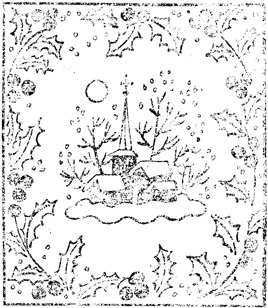
Christmas Celebrations
Christmas Day is observed on the 25th of December. In Britain this day was a festival long before the conversion to Christianity. The English historian the Venerable Bede* relates that "the ancient peoples of Angli began the year on the 25th of December, and the very night was called in their tongue modranecht, that is 'mother's night'. Thus it is not surprising that many social customs connected with the celebration of Christmas go back to pagan times, as, for instance, the giving of presents. Indeed, in 1644 the English puritans forbade the keeping-of Christmas by Act of Parliament, on the grounds that it was a heathen festival. At the Restoration Charles II** revived the feast.
* (The Venerable Bede - Baeda (673-735), English historian, teacher and theologian )
** (Charles II - English King; reigned 1660-1685.)

Though religion in Britain has been steadily losing ground and Christmas has practically no religious significance for the majority of the population of modern Britain, it is still the most widely celebrated festival in all its parts except Scotland. The reason for this is clear. With its numerous, often rather quaint social customs, it is undoubtedly the most colourful holiday of the year, and, moreover one that has always been, even in the days when most people were practising Christians, a time for eating, drinking and making merry.
However, despite the popularity of Christmas, quite a number of English people dislike this festival, and even those who seem to celebrate it wholeheartedly, have certain reservations about it. The main reason for this is that Christmas has become the most commercialized festival of the year. The customs and traditions connected with Christmas, for example giving presents and having a real spree once a year, made it an easy prey to the retailers, who, using modern methods of advertising, force the customer to buy what he neither wants nor, often, can reasonably afford.
It is not only children and members of the family that exchange presents nowadays. Advertising has widened this circle to include not only friends and distant relations, but also people you work with. An average English family sends dozens and dozens of Christmas cards, and gives and receives almost as many often practically useless presents. For people who are well off this entails no hardship, but it is no small burden for families with small budgets. Thus saving up for Christmas often starts months before the festival, and Christmas clubs have become a national institution among the working class and lower-middle class. These are generally run by shopkeepers and publicans over a period of about eight weeks or longer. Into these the housewives pay each week a certain amount of money for their Christmas bird* and joint, their Christmas groceries and so on, the husband as a rule paying into the club run by the local pub, for the drinks.
* (Traditionally, turkey or goose.)
As much of this spending is forced upon people and often means that a family has to do without things they really need, it inevitably leads to resentment towards the festival. Needless to say that it isn't the old customs and traditions that are to blame, but those who make huge profits out of the nationwide spending spree which they themselves had boosted beyond any reasonable proportion.
|
ПОИСК:
|
© GENLING.RU, 2001-2021
При использовании материалов сайта активная ссылка обязательна:
http://genling.ru/ 'Общее языкознание'
При использовании материалов сайта активная ссылка обязательна:
http://genling.ru/ 'Общее языкознание'